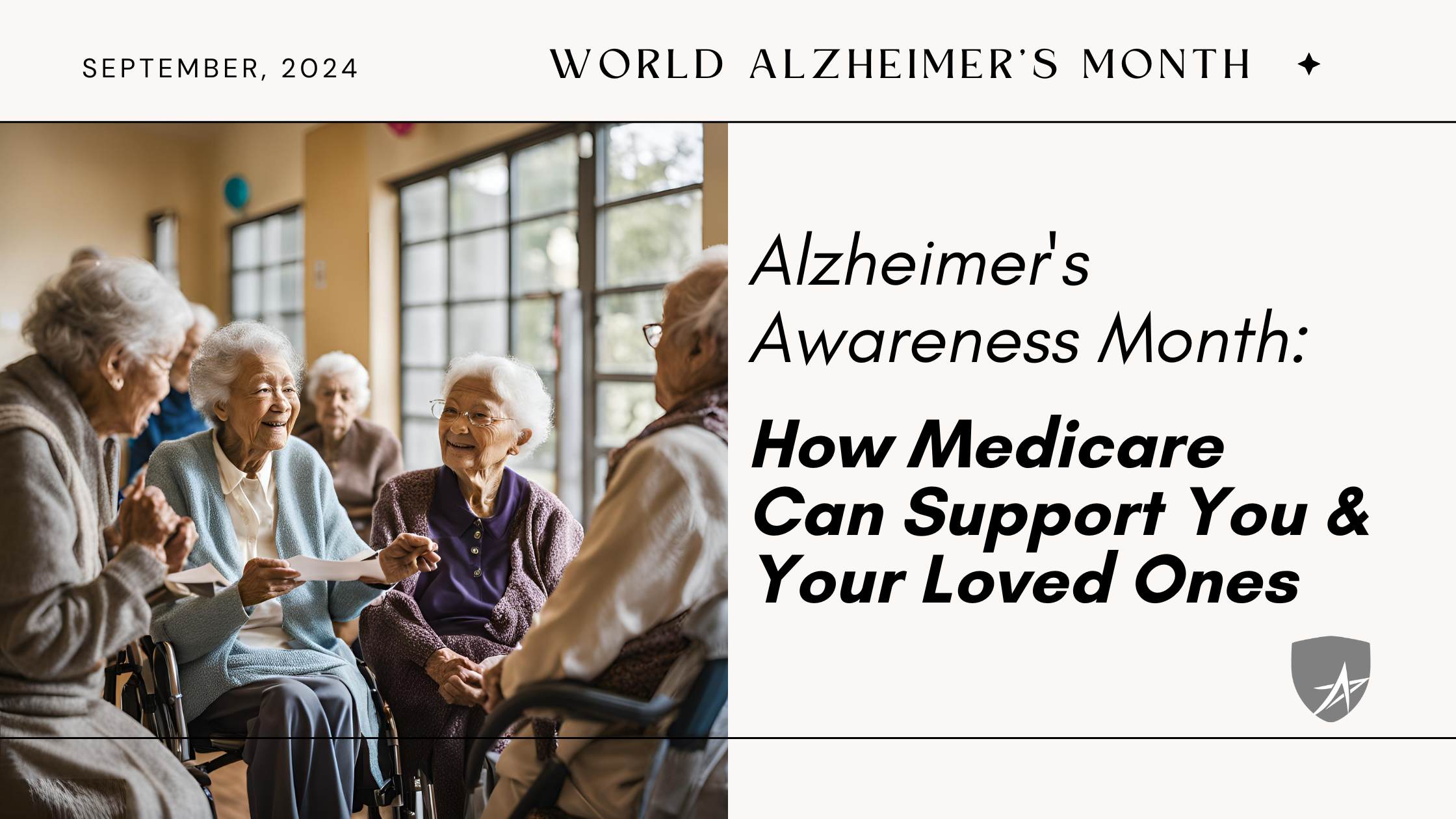
As we honor Alzheimer’s Awareness Month, it’s important to understand how Medicare can help those affected by Alzheimer’s disease. Whether you’re a patient, caregiver, or family member, navigating healthcare can be challenging—but Medicare provides essential coverage that can ease the burden of managing this condition. By being informed, you can ensure you or your loved one receives the best care available.
Recognizing Early Signs of Alzheimer’s Disease
Early detection of Alzheimer’s disease can significantly impact the management and treatment of the condition. Here are some common early signs to be aware of:
- Memory Loss: Difficulty remembering recent events or conversations.
- Confusion with Time and Place: Losing track of dates, seasons, and the passage of time.
- Difficulty Performing Familiar Tasks: Trouble with routine tasks, such as managing finances or following a recipe.
- Challenges in Problem-Solving: Struggling to develop and follow a plan or solve problems.
- Disorientation and Misplacing Items: Putting things in unusual places and being unable to retrace steps.
If you or a loved one is experiencing these symptoms, it’s important to consult a healthcare professional for a thorough evaluation. Medicare offers resources and coverage to support early diagnosis and ongoing management.
Medicare Coverage for Alzheimer’s Disease
Medicare is a key resource in helping seniors access the care they need for Alzheimer’s disease. Let’s break down how each part of Medicare works and what it can offer to support those affected by this illness.
Medicare Part A: Inpatient Care and Hospice
Medicare Part A covers hospital stays, skilled nursing facility care, hospice, and some home healthcare. For Alzheimer’s patients, this may include:
- Inpatient Hospital Care: If a patient experiences severe health issues that require hospitalization, Part A covers the stay.
- Skilled Nursing Facility (SNF) Care: After a hospital stay, Part A covers care at a skilled nursing facility for ongoing medical treatment.
- Hospice Care: For patients with terminal Alzheimer’s, hospice care is provided to manage pain and offer emotional support during the end stages of the disease.
Medicare Part B: Doctor Visits and Preventive Services
Medicare Part B provides coverage for outpatient services, doctor visits, and preventive care, which are critical for early detection and ongoing treatment. For Alzheimer’s patients, this includes:
- Cognitive Assessments: During routine doctor visits, cognitive tests can help detect early signs of Alzheimer’s.
- Therapies: Physical, occupational, and speech therapy are covered to maintain daily functioning and improve quality of life.
- Mental Health Support: Counseling services and mental health visits are covered to help manage emotional challenges related to Alzheimer’s.
Medigap (Medicare Supplement Insurance)
Medicare Supplement Insurance (Medigap) helps cover out-of-pocket costs like copayments, coinsurance, and deductibles, offering financial relief for Alzheimer’s patients and their families. This can be especially helpful when covering the costs of hospital stays or outpatient care.
Medicare Part D: Prescription Drug Coverage
Alzheimer’s patients often rely on medications to manage their symptoms. Medicare Part D helps cover the cost of these drugs, including:
- Cholinesterase Inhibitors: Medications like donepezil and rivastigmine are prescribed for mild to moderate Alzheimer’s symptoms.
- NMDA Antagonists: Memantine, a common treatment for moderate to severe Alzheimer’s, helps manage symptoms by regulating certain brain chemicals.
- Other Medications: Medicare Part D also covers drugs for managing secondary symptoms, such as anxiety, depression, and agitation, which are common in Alzheimer’s patients.
Prevention and Early Detection
While there is no cure for Alzheimer’s disease, early detection and proactive care can significantly improve the quality of life for those affected. Here are some ways Medicare can help with prevention and early detection:
Annual Cognitive Screenings
Medicare Part B covers an annual wellness visit, which includes screenings for cognitive impairment. These assessments can help catch Alzheimer’s early, allowing for earlier intervention and better management of symptoms.
Lifestyle Choices and Alzheimer’s Prevention
Research suggests that making healthy lifestyle choices—like staying physically active, mentally engaged, and eating a balanced diet—can help lower the risk of cognitive decline. By promoting healthy habits, seniors may be able to reduce their chances of developing Alzheimer’s or slow the progression of symptoms.
Did you Know…. According to the Alzheimer’s Association, more than 6 million Americans are currently living with Alzheimer’s. Without breakthroughs in treatment, this number is projected to nearly double to 13 million by 2050. (https://www.alz.org)
Ongoing Support and Care for Alzheimer’s Patients
As the disease progresses, Alzheimer’s patients need continuous medical and community support. Medicare offers several services that can assist families and caregivers in providing the best care possible.
Home Healthcare Services
Medicare Part B covers intermittent home health services, which may include nursing care, physical therapy, and assistance with activities of daily living. This allows Alzheimer’s patients to receive the care they need in the comfort of their own homes.
Caregiver Support
Caring for a loved one with Alzheimer’s can be emotionally and physically demanding. Some Medicare Advantage plans offer caregiver support services, including respite care, which gives caregivers a break while ensuring their loved one is still cared for.
Did You Know? Nearly 1 in 5 Medicare beneficiaries are living with Alzheimer’s disease or a related form of dementia, according to the Centers for Medicare & Medicaid Services (CMS).
Medications and Management: How Medicare Part D Can Help
Many Alzheimer’s patients require multiple medications to manage both cognitive and behavioral symptoms. Reviewing your Medicare Part D plan can ensure you have coverage for the drugs you need at the lowest possible cost. Discuss with your doctor and pharmacist which medications are covered and what alternatives might be available.
Navigating Alzheimer’s with Medicare Support
Alzheimer’s disease presents many challenges, but Medicare may provide essential resources to help manage care and reduce the financial burden on patients and their families. From inpatient care and doctor visits to home health services and prescription drug coverage, Medicare offers a comprehensive range of support for those living with Alzheimer’s.
If you are new to Medicare and would like to learn more about your healthcare coverage and the preventive services that may be included in your plan, please contact us to schedule an appointment. With significant changes on the horizon for Medicare coverage in 2025, it’s crucial to start preparing now. The Annual Enrollment Period is just around the corner, and every senior should be reevaluating their plans to ensure they will have the proper coverage in 2025. You are not alone—our team is here to assist you during this transition and ensure you get the support you need. Contact our office today to schedule your annual coverage review appointment.


